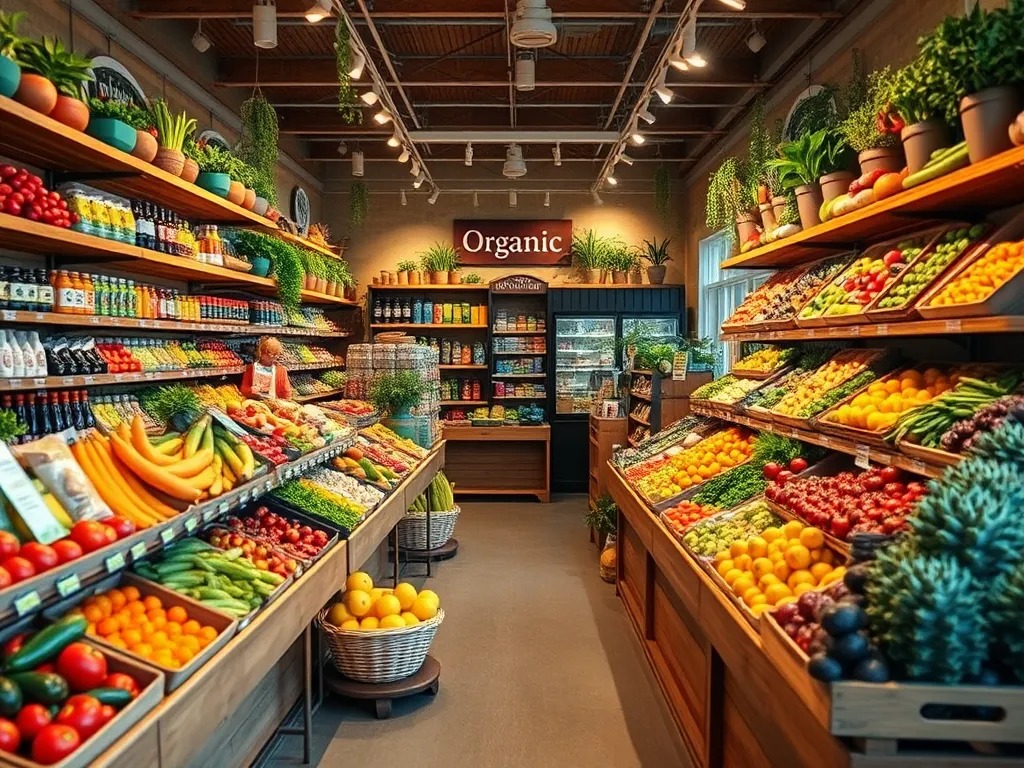Your Ultimate Guide to Organic Grocery Shopping in Calgary

Organic Grocery Shopping in Calgary: A Comprehensive Guide
Organic grocery shopping in Calgary has gained immense popularity in recent years as more individuals recognize the benefits of consuming organic foods. In a bustling city like Calgary, residents are increasingly mindful of their nutrition, with many opting for organic produce over conventional alternatives. This shift not only supports healthier lifestyles but also promotes sustainable and environmentally friendly farming practices that are vital for our planet.
In Calgary, organic grocery shopping can be an exciting journey filled with various options. The city boasts a mix of organic stores, farmers' markets, and online retailers, offering a plethora of organic products ranging from fresh produce to dairy and meat. As consumers become more informed about the health benefits of organic foods, the demand continues to rise, pushing local markets and retailers to expand their organic offerings to meet this growing need.
For those new to organic grocery shopping in Calgary, understanding the differences between organic and conventional products is key. Organic foods are grown without synthetic pesticides, herbicides, or fertilizers, and livestock is raised without antibiotics or growth hormones. This approach to agriculture not only promotes better health but also contributes to the preservation of biodiversity and a reduction in environmental pollution. As more people explore this lifestyle, it's essential to know where to find the best organic options throughout the city.
With the diversity of organic shopping venues available in Calgary, shoppers can choose their preferred method of sourcing organic products. Whether visiting a local farmers' market, browsing a specialty store, or shopping online, consumers have access to a wide variety of organic foods. This makes it easier than ever to incorporate organic ingredients into daily meals and support local farmers and businesses in the process.
In summary, organic grocery shopping in Calgary is not just a trend but a lifestyle choice that emphasizes health, sustainability, and community support. As the organic market continues to grow, residents of Calgary have more opportunities than ever to make informed dietary choices and contribute to a healthier planet for future generations.
Best Organic Stores in Calgary
Calgary is home to several top-rated organic grocery stores that cater to the needs of health-conscious shoppers. Places like Community Natural Foods and Blush Lane Organic Market are renowned for their wide selection of organic produce, pantry staples, and health products. These stores focus on providing high-quality organic goods while also promoting eco-friendly practices and supporting local farmers and artisans.
In addition to specialized grocery stores, Calgary also hosts numerous farmers' markets where shoppers can find fresh, locally-sourced organic produce. The Calgary Farmers' Market, for example, offers an array of organic fruits and vegetables, meats, dairy, and artisanal products, making it a perfect spot for those looking to buy direct from local producers. Shoppers enjoy the opportunity to meet farmers and learn about their growing practices, fostering a sense of community and appreciation for local agriculture.
For those who prefer the convenience of shopping from home, Calgary has various online retailers specializing in organic products. Services like SPUD.ca and Lucky's Farm Shop allow customers to order organic groceries online and have them delivered straight to their door. This accessibility makes it easier to incorporate organic foods into busy lifestyles without sacrificing quality or variety.
Calgary also features specialty stores dedicated to organic and natural products. Shops like Earth's General Store and The Organic Box provide niche organic items, including gluten-free and vegan options, catering to specific dietary needs. These stores are excellent resources for finding unique organic products that may not be available in traditional grocery stores.
Benefits of Organic Foods
The nutritional advantages of organic produce are well-documented, as studies indicate that organic foods often contain higher levels of antioxidants, vitamins, and minerals compared to their conventional counterparts. Organic farming practices result in healthier soil and plants, leading to more nutrient-rich produce. For consumers, this means that choosing organic can contribute to overall better health and well-being.
Organic farming also has a positive environmental impact, promoting biodiversity and reducing pollution. By avoiding synthetic chemicals, organic farms help preserve water quality and protect wildlife habitats. Additionally, organic farming practices, such as crop rotation and composting, contribute to sustainable land management, ensuring that the earth remains fertile and productive for generations to come.
Another significant benefit of choosing organic foods is the potential health advantages. Many consumers report fewer allergy symptoms and digestive issues when they switch to organic products, which may be attributed to the absence of harmful chemicals and additives present in some conventional foods. Furthermore, organic meats and dairy products tend to be free from antibiotics and hormones, creating healthier protein sources.
While organic foods can be more expensive upfront, they can be cost-effective in the long run. By investing in organic produce, consumers may experience fewer health issues and associated medical costs. Additionally, buying in bulk or shopping at farmers' markets can provide cost savings, making organic options more affordable over time.
Budgeting for Organic Groceries
Shopping for organic groceries does not have to break the bank. There are several tips for saving money on organic purchases, such as buying in bulk, taking advantage of sales, and joining loyalty programs at local stores. Many organic retailers offer discounts and promotions periodically, making it easier for budget-conscious consumers to enjoy organic options without overspending.
Creating a budget for organic shopping is essential for maintaining financial control while making healthier choices. Keep track of organic products that you regularly purchase and allocate a specific amount for organic groceries each month. This approach allows for effective planning and ensures that organic shopping remains sustainable for your wallet.
Finding discounts and deals on organic items is more accessible than ever. Many retailers provide weekly flyers showcasing sale items, and online resources can help shoppers identify the best local deals. Additionally, using coupon websites and apps can allow consumers to save on organic purchases, providing further incentives to choose organic.
When budgeting for groceries, it can often be helpful to compare the costs of organic versus non-organic items. While organic products might seem pricier, evaluating the overall quality, nutritional benefits, and long-term health implications can clarify why many consumers choose organic over conventional options, leading to informed spending decisions.
Seasonal Organic Shopping
To maximize the benefits of organic grocery shopping in Calgary, it's essential to know the best times to buy organic produce. Seasonal organic foods are generally fresher, more flavorful, and more affordable than out-of-season options. Plan your purchases around the peak harvest seasons for fruits and vegetables to enjoy the best quality and prices.
Understanding local growing seasons is vital for successful seasonal organic shopping. In Calgary, the growing season typically runs from late spring to early fall, with various crops reaching their peak during specific months. Familiarizing yourself with these seasons can help you know when to shop for particular items and encourage supporting local farmers.
Planning meals around seasonal organic foods can enhance your culinary experience while promoting sustainable eating habits. By choosing recipes that highlight seasonal ingredients, you can enjoy fresher produce, minimize food waste, and create flavorful dishes that are naturally aligned with the seasons.
Lastly, preserving seasonal organic produce is a fantastic way to enjoy its benefits year-round. Techniques such as canning, freezing, and drying can prolong the shelf life of seasonal items, allowing you to savor your favorite organic fruits and vegetables even when they are out of season.
Organic Grocery Shopping Tips
When embarking on your organic grocery shopping journey, it's essential to know how to read organic labels effectively. Look for the USDA Organic seal, which indicates that the product meets strict organic standards. Familiarizing yourself with different labels can help ensure that you make informed choices when selecting organic products.
Understanding certifications for organic foods is also important in ensuring the integrity of the products you buy. Various certifications exist beyond the USDA Organic label, such as Non-GMO Project Verified and Certified Humane. Being aware of these certifications can provide additional assurance about the quality and ethical standards of the organic foods you purchase.
Creating a shopping list for organic groceries can streamline your shopping experience and reduce impulse purchases. Before heading to the store or market, take inventory of your pantry and fridge to identify which organic items you need. A well-planned list makes it easier to stay focused and stick to your budget.
Lastly, consider strategies for bulk buying organic items. Purchasing staples like grains, nuts, and dried fruits in bulk can lead to substantial savings. Many health food stores and co-ops offer bulk bins, allowing shoppers to take only what they need while reducing packaging waste and supporting sustainable practices.
